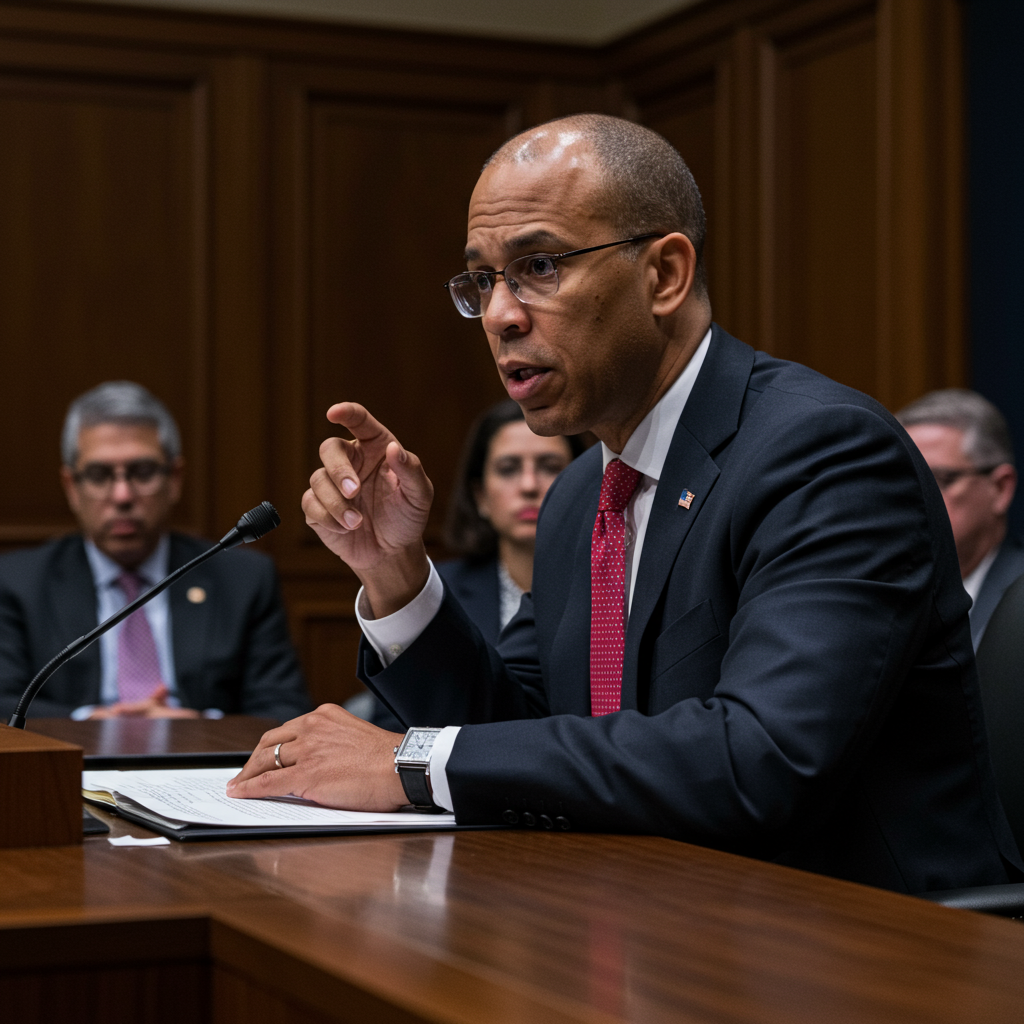A seismic confrontation rocked the Senate Judiciary Committee on September 16, 2025, as FBI Director Kash Patel faced intense scrutiny. Senator Cory Booker, representing New Jersey, launched a blistering attack, accusing Patel of orchestrating the “generational destruction of the nation’s premier law enforcement agency.” This heated exchange underscores growing concerns about the politicization of the FBI and the integrity of its leadership. The tense hearing, punctuated by shouting matches, left observers questioning the stability of the bureau and the duration of Patel’s contentious tenure.
A Fiery Exchange: Booker Accuses FBI Director of Agency “Destruction”
The hearing quickly devolved into a verbal battle, with Senator Booker delivering pointed criticisms. He asserted that FBI Director Kash Patel was installing “mega loyalists” and initiating an “unprecedented purge” of experienced agents. Booker argued these actions were making the country “weaker and less safe.” His impassioned accusations suggested that Patel had fundamentally compromised the FBI’s operational capacity and impartiality.
Patel did not shy away from the confrontation. He retaliated by labeling Senator Booker an “embarrassment,” immediately escalating the dispute. The verbal sparring necessitated gaveling for order from Republican committee chairman Sen. Chuck Grassley. Despite the attempt to restore calm, Booker pressed on. He boldly predicted the brevity of Patel’s leadership, stating, “I don’t think you’re long for this job.” Booker further warned that former President Trump, who appointed Patel, “will cut you loose,” implying a lack of enduring political support.
Unpacking the Allegations: Politicization and Retaliation Claims
A core theme of the Democratic senators’ questioning revolved around allegations of political retribution. They cited concerns that Patel’s tenure had seen a significant number of experienced career officials purged from their roles. Some senators suggested “loyalty tests” were being implemented. They also expressed worry that resources were being unwisely diverted towards immigration enforcement. These actions, they argued, came at the expense of core public safety missions.
These concerns were substantiated by a lawsuit filed by Brian J. Driscoll, Jr., a former acting FBI director, and other officials. The lawsuit alleged a campaign of retribution for perceived insufficient political loyalty. It claimed Patel had communicated that his superiors directed him to fire anyone involved in criminal probes against Trump. Patel’s job, according to the suit, depended on these terminations.
FBI Director Kash Patel vehemently denied these accusations. He asserted that no one at the FBI was terminated based on their case assignments alone. Instead, he claimed terminations were based on failing job duties. Patel also explicitly denied receiving orders from the White House regarding personnel decisions. He attributed the allegations to “ongoing litigation,” stating the claims would be settled in court.
Key Controversies Under Scrutiny: From Kirk to Epstein
Beyond the immediate personnel disputes, senators pressed FBI Director Kash Patel on several high-profile investigations. These inquiries highlighted critical issues regarding the bureau’s handling of sensitive cases and its public communication strategies. The hearing delved into both recent controversies and long-standing concerns, further complicating Patel’s defense of his leadership.
The Charlie Kirk Assassination: Patel’s Public Information Debacle
A major point of contention was Patel’s handling of the investigation into the killing of conservative activist Charlie Kirk. Following Kirk’s death, Patel had posted a statement on social media suggesting a “subject in custody.” This post proved to be premature, as the individual was later released as unconnected to the crime. Senator Peter Welch (D-Vt.) directly challenged Patel, asserting that the post created confusion among the public.
Patel defended his actions, stating his intent was to “work with the public” during the manhunt. He conceded he “could have been more careful in my verbiage,” but maintained he had not intentionally misled. He highlighted the FBI’s extensive efforts in the investigation, including numerous tips and digital submissions. Patel also confirmed ongoing investigations into a Discord chat where the suspect allegedly confessed. Broader discussions during this segment touched on the balance between free speech and online incitement, and calls for gun violence prevention legislation.
Jeffrey Epstein Case: A Resurfacing of Unanswered Questions
The long-running Jeffrey Epstein case also came under renewed scrutiny. FBI Director Kash Patel vigorously defended the current administration’s approach to the case. He unequivocally stated that Jeffrey Epstein was not an FBI intelligence asset. Patel placed blame for the initial mishandling of the case on former Labor Secretary Alex Acosta. Acosta was the prosecutor in Epstein’s 2006 Florida case, allowing a limited investigation and a nonprosecution agreement.
Despite persistent questioning, Patel stated there was “no credible information” to suggest Epstein trafficked women to anyone else but himself. He clarified, however, “I am not saying that others were not trafficked and others were not involved.” Patel committed to releasing all legally permissible information. His assertions aimed to quell ongoing speculation, though some senators, like Dick Durbin, questioned an unsigned DOJ/FBI memo concluding no incriminating client list in Epstein’s files.
FBI Leadership Under Fire: “Weaponization” and Internal Upheaval
The accusations of “weaponizing” the FBI against political opponents were central to the Democrats’ line of questioning. Senator Sheldon Whitehouse (D-RI) questioned Patel about an alleged “enemies list” from his 2023 book, “Government Gangsters.” Whitehouse estimated adverse actions against approximately 20 individuals featured in the book. Patel dismissed this as an “entirely inaccurate presupposition” and denied having such a list. He also rejected reports of using polygraphs for “loyalty tests,” clarifying that polygraphs are used to track down leaks and unauthorized disclosures within the bureau.
Patel strongly affirmed that the FBI “won’t be weaponized anymore” under his leadership. He committed to pursuing cases based “in fact and law” and promised a review of past weaponization. He also explicitly denied that the FBI, under his leadership, asks potential agents about their voting history. The presence of Deputy Director Dan Bongino, whom Senator Durbin called a “conspiracy theorist,” also drew scrutiny, highlighting internal divisions within the FBI’s command structure.
Partisan Divides: Republicans Rally Behind Patel’s Reform Efforts
In stark contrast to the Democratic critiques, Republican senators largely expressed support for FBI Director Kash Patel. Committee Chairman Charles E. Grassley (R-Iowa) praised Patel for “returning the FBI to its law enforcement mission.” Grassley criticized Patel’s predecessor, Christopher Wray, for leaving an “FBI infected with politics.” This perspective underscored a deep partisan divide regarding the FBI’s direction.
Republican lawmakers did not raise concerns about the allegations from Democrats. Instead, their questioning focused on traditional law enforcement functions. Senator Josh Hawley (R-Mo.) inquired about the FBI’s investigation into the Charlie Kirk assassination. He questioned if it was part of a pattern of “anti-religious, anti-Christian violence.” Patel highlighted what he presented as significant accomplishments during his seven-month tenure. These included the arrest of 23,000 violent felons, the seizure of 6,000 weapons, and the apprehension of 1,500 child predators. He attributed these “early successes” to a renewed focus on fighting violent crime and protecting children.
The Broader Implications: Navigating Trust and Political Polarization
The contentious Senate Judiciary Committee hearing on September 16, 2025, represents a critical moment for the FBI. The clash between Senator Cory Booker and FBI Director Kash Patel brought to the forefront deep-seated concerns about the agency’s independence and public trust. In an era of heightened political polarization, the FBI’s ability to maintain its reputation as an impartial law enforcement body is paramount. Questions surrounding personnel decisions, controversial investigations, and accusations of politicization pose significant challenges to the bureau’s integrity. As the nation grapples with internal strife and rising fears of political violence, the leadership and perceived neutrality of the FBI are more crucial than ever. The outcomes of such oversight will undoubtedly shape the future trajectory of the nation’s premier law enforcement agency.
Frequently Asked Questions
What were the main accusations leveled against FBI Director Kash Patel during the hearing?
During the Senate Judiciary Committee hearing on September 16, 2025, Senator Cory Booker and other Democrats accused FBI Director Kash Patel of “generational destruction” of the agency. Key accusations included orchestrating an “unprecedented purge” of experienced officials, installing “mega loyalists,” engaging in political retribution, and making the nation “weaker and less safe.” Critics also alleged that Patel had lied during his confirmation about protecting employees from political retaliation.
What specific actions did FBI Director Patel defend during the hearing?
FBI Director Kash Patel defended several actions and decisions during his testimony. He defended his controversial social media post during the Charlie Kirk assassination investigation, acknowledging he “could have been more careful” but denying intentional misleading. Patel also vigorously defended his personnel decisions, stating terminations were based on job performance, not political motives or White House orders. Additionally, he asserted that in the Jeffrey Epstein case files, there was “no credible information” of Epstein trafficking women to anyone other than himself, and confirmed Epstein was not an FBI asset.
What is the perceived impact of the hearing on the future of FBI leadership and public trust?
The hearing exposed deep partisan divides and raised serious questions about the FBI’s leadership and its integrity. Senator Booker’s prediction of Patel’s short tenure, coupled with Republican praise for his “reform efforts,” highlights an unstable environment. The ongoing litigation, accusations of politicization, and internal strife are likely to erode public trust in the agency’s impartiality. The hearing underscores the immense pressure on the FBI to demonstrate independence and accountability amidst a highly polarized political landscape.



